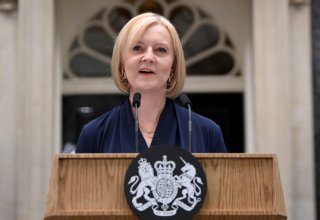The Truss Challenge: Can a Besieged Britain Be Saved?
Things are bad in Britain and they’re likely to get worse.
Liz Truss has just become Britain’s prime minister after she was elected leader of the Conservative Party yesterday. In the end, it was not close.
Truss’ people have known that they would win for quite a while. They openly spent a mid-August weekend hunkered down in a taxpayer-funded country house, planning the shape of her government.
Beyond all the new appointments, which have been extensively briefed to the newspapers, the Truss campaign did its best to say that it understood the scale of the crises it must now confront.
There will be an emergency budget in a few weeks, we are told. This is all well and good. But it lays bare something else: how little real meat there was in the economic plans and prognoses of both campaigns, and how much was left unsaid.
Things are bad in Britain and they’re likely to get worse. Energy prices are rising precipitously, while the government’s regulator, Ofgem, feebly administers a “price cap” which does not cap prices. Inflation is cripplingly high and rising, and interest rates are too low. It still pays to borrow money beyond your means.
Plaintive wails are heard across the economy. Shop and pub owners insist, looking at their heating bills alone, that they will have to close next year—forever. Excitable individuals now forecast their own freezing to death on national TV.
Is this perhaps excessive? Almost certainly. But Britain’s state is crumbling. We have not built reservoirs in decades; much of our nuclear energy will shortly come offline; our energy systems are even prevented by planning regulations from increasing their output.
There has been much more talk among crisis planners of how precisely the country would manage in wintertime blackouts. Would homes go without power, or would we throttle industry? These are difficult decisions, and the next prime minister has so far chosen not to be drawn.
Decades of underinvestment have meant that we cannot house our citizens nor ensure that their employers can keep the lights on. This is a disastrous state of affairs and addressing it ought to be the first priority.
Truss says she wants Britain to have a dynamic, low-tax economy, where growth is not limited by arbitrary restriction nor tied up in legal costs. This is a worthwhile goal—but two things stand in her way. The first is the magnitude of the coming crisis, which Truss will need to survive with the help of weapons of last resort (namely, cash handouts which she had previously foresworn).
And the second is the fundamental brokenness of Britain’s economy and society: each a domain in which vetoes are king, obstruction is considered evidence of sanity and deliberation, and many people would rather the economy never grow again if they can avoid unwelcome change to their own vicinity.
Britain is a place where gargantuan windfarms can be delayed over a year because an irate local dislikes their effect on the sea view—and where the courts take his side. Britain's administrative state—its legal status quo, its civil service, its accountants, all love obstruction. Its courts will fight new building tooth and nail. Its Treasury will fight tax cuts of all kinds on the grounds of fiscal prudence.
These things ought to stoke Truss’s principles. Why not abolish the regimes in planning and zoning which mean no one can build a thing? Why not cut burdensome business taxes and taxes on consumption which make the poorest poor? She inherits an enormous parliamentary majority, after all.
These principles are easy to articulate, but they are hard to implement.
Truss faces electoral, practical, even philosophical challenges. Voters want to be saved but they don’t want the country to change. They want cash in their pockets but don’t want the things that bring economic growth.
This is a paradox that Truss must understand and learn to face down.
She must confront an administrative state dead set against her every idea, a country weary and tired and demanding free money, and an economy which has been largely sustained on a bubble of cheap credit and quantitative easing for the past fifteen years. A country that screams in pain when interest rates increase to lower-than-normal levels.
This is a daunting enough task. But not only that—she also faces an election in two or so years that no one expects her to win. Two years is not a long time, and when the fear of defeat truly strikes Conservative members of parliament, they will fight all the harder to have Truss avoid hard truths all the quicker: prosperity, even national survival, be damned.
The think-tanker Christopher Snowdon has described the country Truss will soon govern as “lobotomy Britain.” It’s a fitting phrase.
It is a place where economic gravity has long ceased to hold down the size of people’s demands of the state, and where the state’s crippling weaknesses have not kept it on the floor, but instead see it feebly pretending to stand tall.
When reality finally returns—in the heart of a cold, hard winter—we must hope that Truss has a plan that she has so far not articulated. Otherwise, all her best impulses will mean nothing and she will shortly suffer a terrible, historic defeat.
James Snell is a Senior Advisor at the New Lines Institute.
Image: Reuters.

